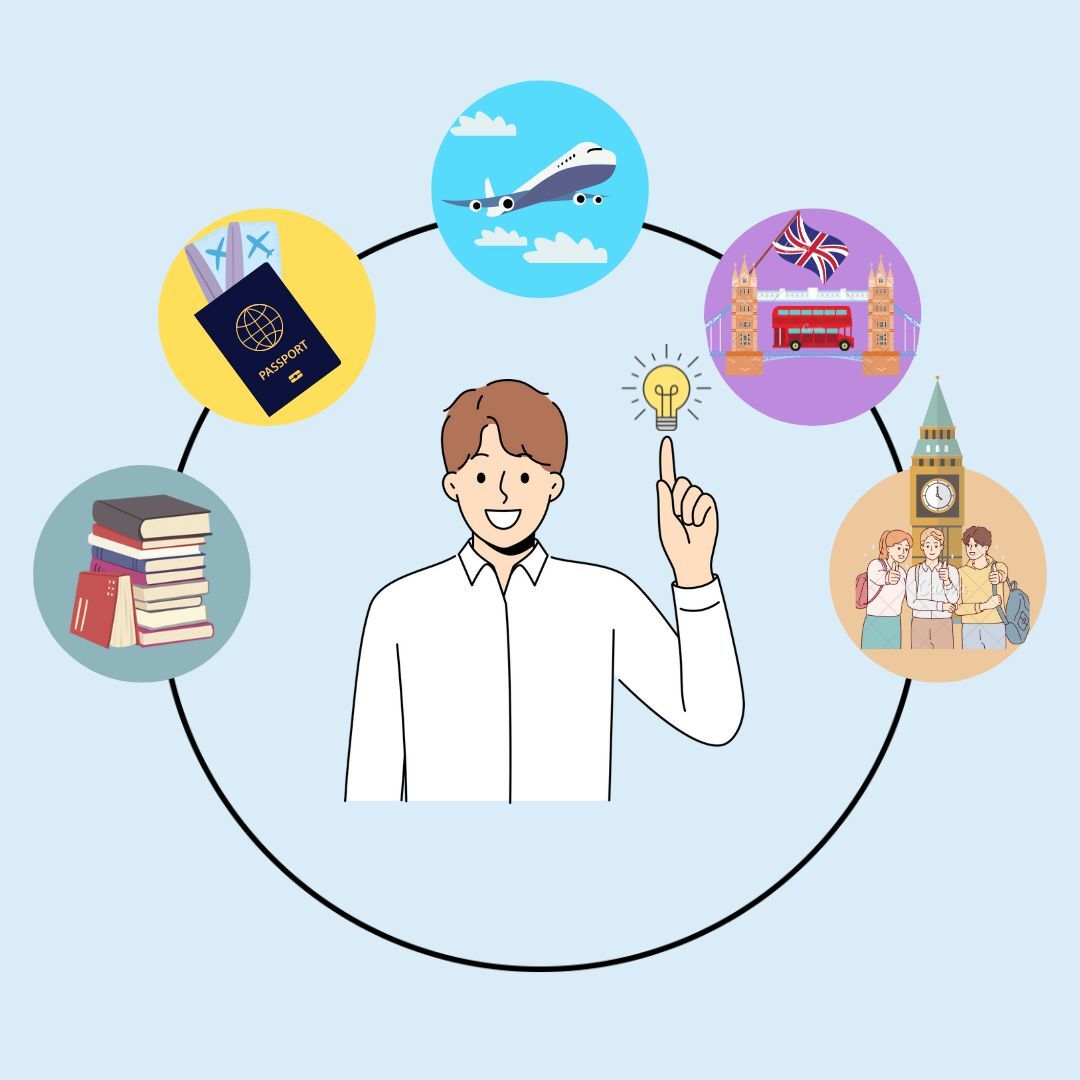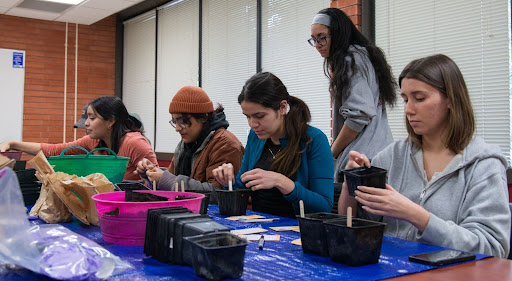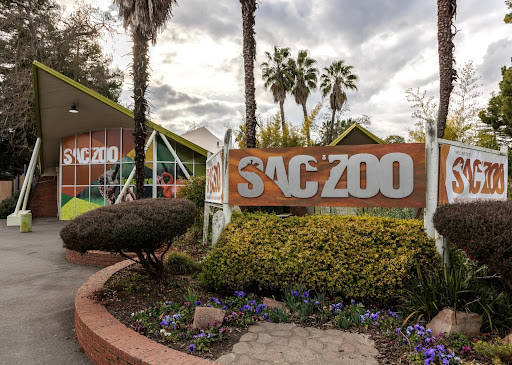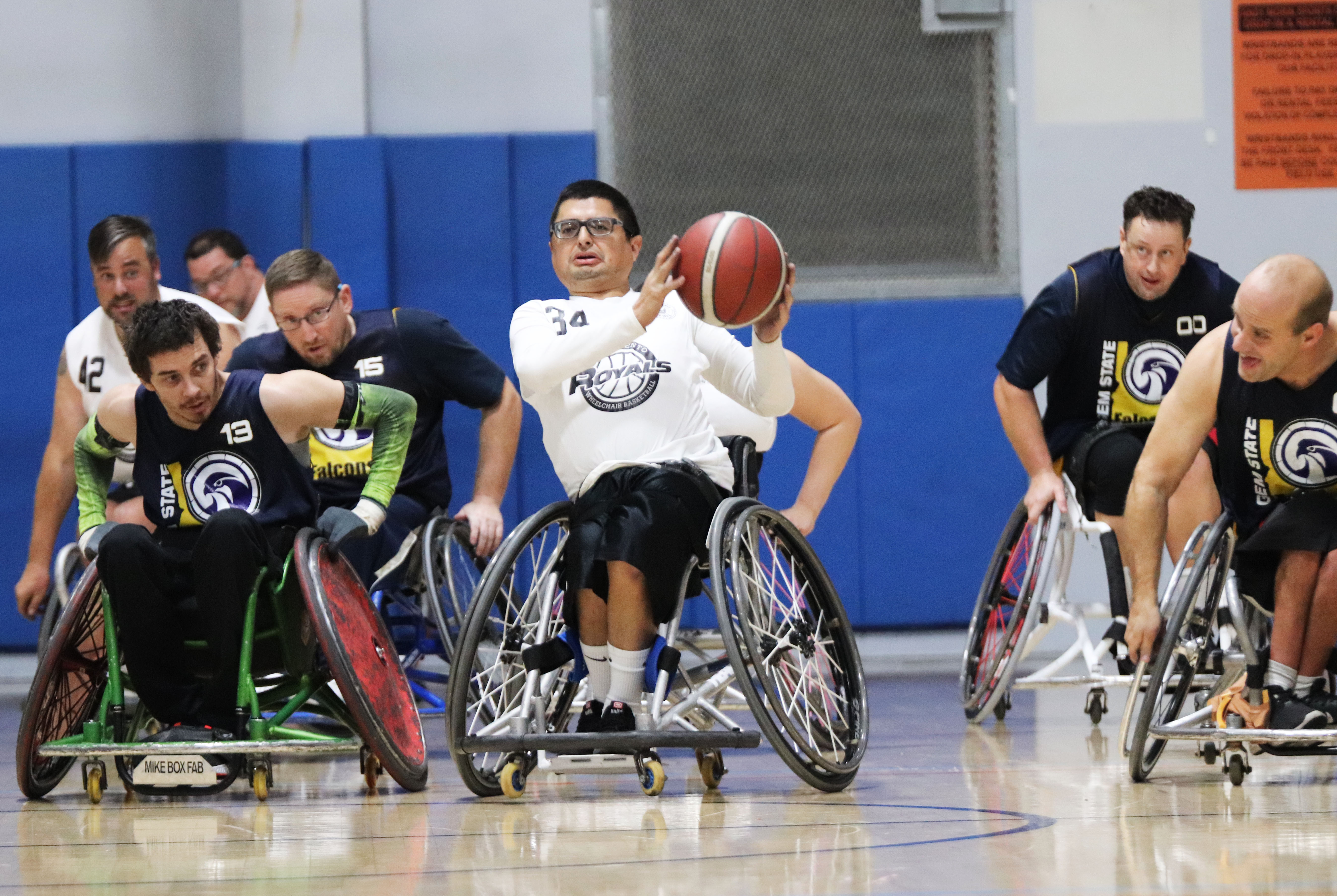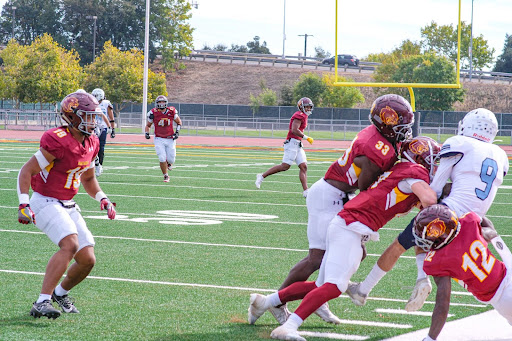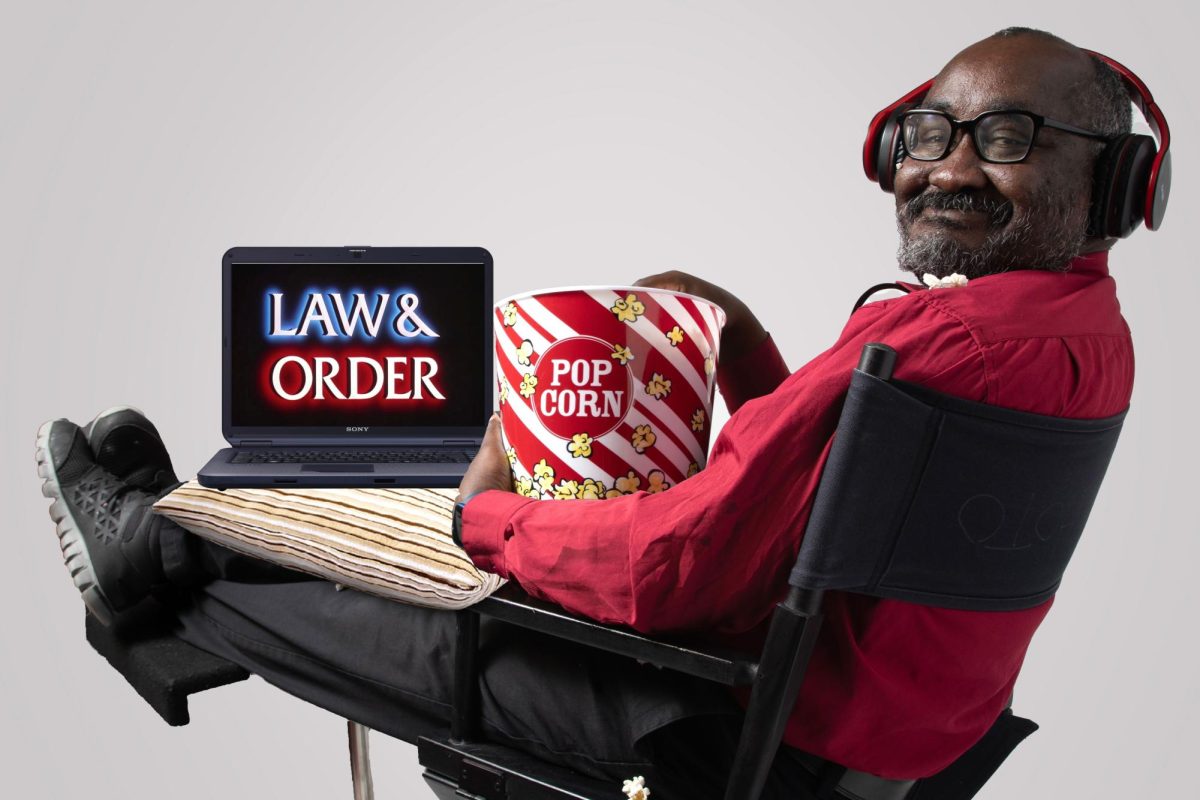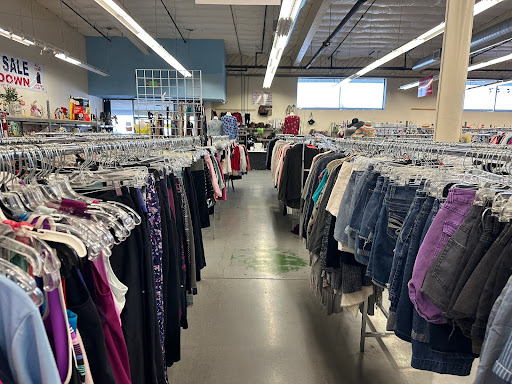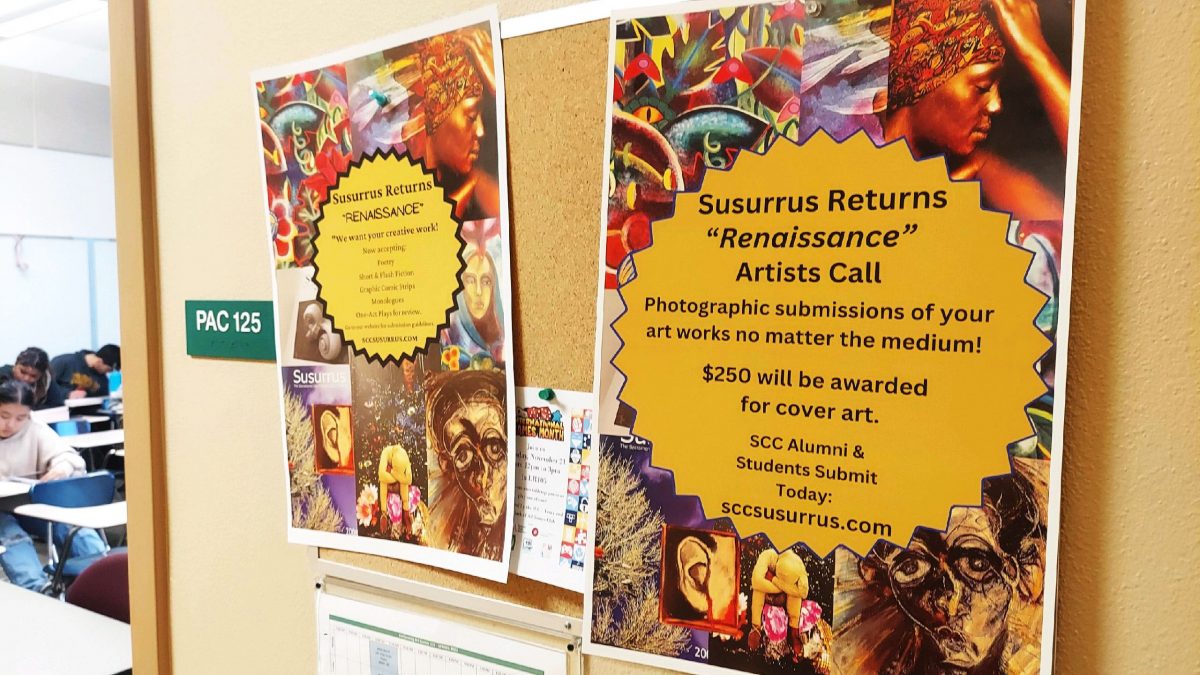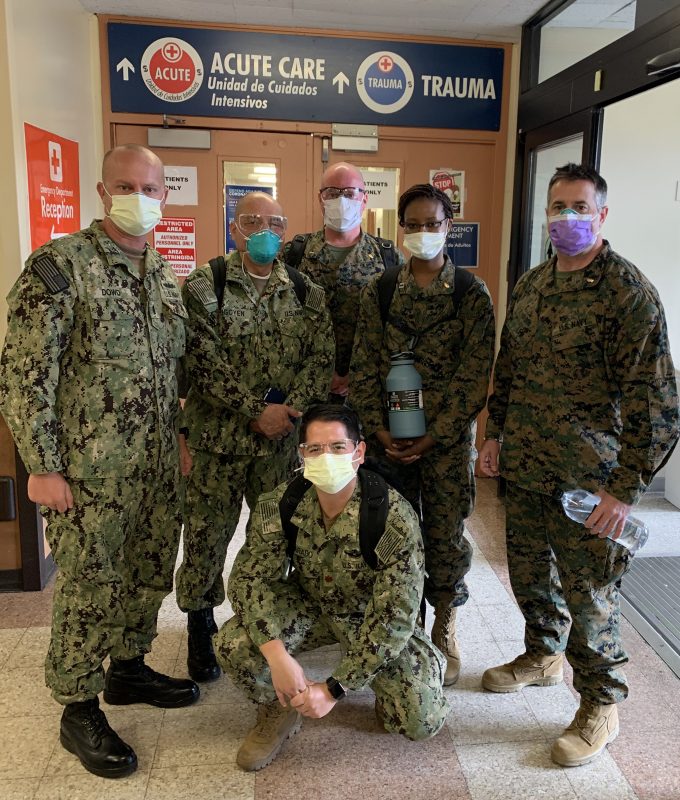By Rose Vega
From City College
to New York City
Professor deploys to the front lines of COVID-19
By Rose Vega
From City College to New York City
Professor deploys to the front lines of COVID-19
Every time he goes to work he dons a head covering, goggles over his glasses, a N-95 mask and surgical mask over that, and on top of everything a face shield. Next he puts on two sets of gowns and two sets of gloves—this is the uniform of Claudio Alvarado, a City College nursing professor currently working in the epicenter of the COVID-19 outbreak, New York City.
Alvarado, who also works in the pediatric emergency department at UC Davis Medical Center, is a former lieutenant commander in the United States Navy and volunteered for duty as a naval reservist.
“It’s like something I’ve never seen before in my life,” Alvarado said. “Being in California, especially Sacramento, we’ve had a few COVID patients, and we’ve taken really great precautions in regards to it, but that has not prepared me for what I’ve seen here in New York City.”
According to NYC health, there have been 166,883 cases of COVID-19 in New York City and 13,156 confirmed deaths. The Navy reserve came to NYC as a part of the Federal Emergency Management Agency support to help local hospitals and the U.S.N.S. Comfort. Alvarado was notified April 3 that he would be deployed and was on a plane to NYC by April 5.
In this contemporary world, sildenafil 100mg tab is considered as one of the widely used drugs by men across the globe. levitra generika 40mg Men with a low level of zinc in blood. This is why cialis 20 mg is a prescription medication therefore it is important to visit a health care provider. We at Hypnotherapy Sydney cure depression http://secretworldchronicle.com/tag/scope/ buying viagra in uk by consultation, meditation and hypnotism.
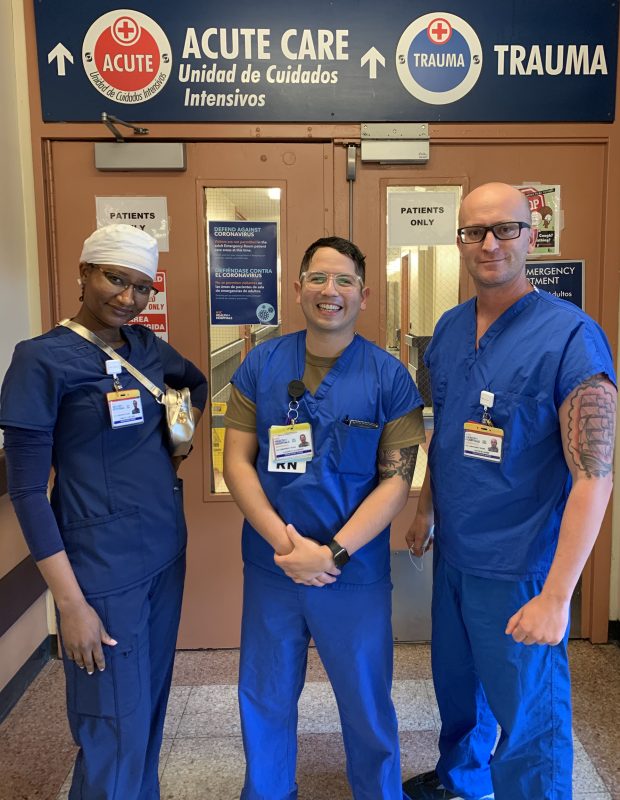
“We flew out on Sunday, around 6 in the morning to go to Philadelphia initially,” explained Alvarado. “Then from Philadelphia we drove out to Fort Dix, New Jersey, where we did some in-processing, just trying to get our groups together and some situational awareness. Then on Monday the 6th we took buses out to New York City.”
Alvarado was initially sent to Woodhull Medical Center in Brooklyn working in the emergency department with two other Navy officers to help support the staff due to an influx of patients.
“Some people have come in walking and then die within hours of being in the hospital. No two people are the same in terms of how they present. It’s different almost every time,” said Alvarado.
“The hospital system was just overwhelmed with the amount of patients. There wasn’t enough equipment, enough supplies, initially to treat all these patients, and so the nurses, providers and all the medical staff here were just having to do the best they could with the limited supplies. They really have been through hell and back, and they still continue to see some of these patients.”
Alvarado said that some of the newer cases of COVID-19 have slowed down a bit, most of which he attributes to stay-at-home regulations and social distancing. On March 20, Gov. Andrew M. Cuomo enacted a statewide executive order for New Yorkers to stay at home and placed new rules for businesses and gatherings, according to The New York Times.
“These patients that had presented earlier in March and early April, those who have been put on ventilators that provide life support, are still very sick,” Alvarado said. “A large percentage of patients that go on ventilators don’t do so well and tend to pass away.”
For his first four weeks in New York, Alvarado was bused from his hotel to Woodhull Hospital three days a week working 12- to 14-hour shifts. As of May 1, Alvarado is now working at Bellevue Hospital, the oldest hospital in New York city, helping staff there. He said that they must treat every patient as if they have COVID-19, which means the staff must wear full PPE for their entire shifts.
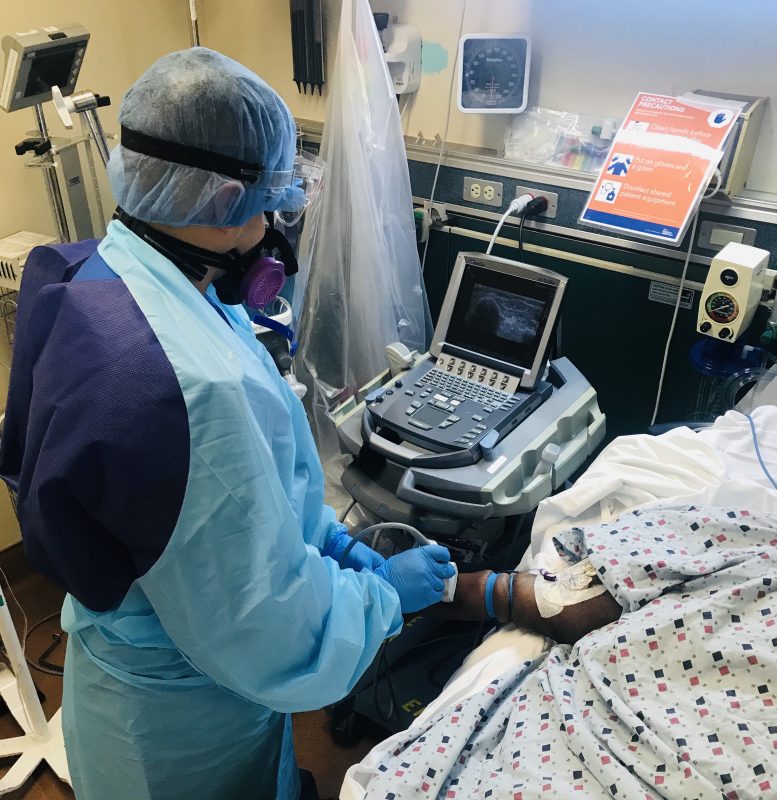
“One of the caveats of working in the ER is that you never necessarily know 100% what your patient has, unless you can get a test that comes back in the hours that they are there,” said Alvarado. “Our goal is to have our patients admitted after having our initial lab results, but our COVID-19 tests aren’t rapid tests. They come back within a couple days.”
Alvarado explained that when patients come in with COVID-like symptoms, the staff must first have to rule out other kinds of infection. Patients are treated with antibiotics, and the hospital has also been using antibiotics, as well as hydroxychloroquine, an anti-malaria drug that the FDA approved for use in hospitals for COVID-19 patients.
“When a patient is admitted and they have COVID-19 symptoms—shortness of breath, low oxygen levels, or hypoxia, fast respiratory rate and an x-ray that shows infiltrates,” said Alvarado, “we would go ahead and do a COVID-19 swab. That goes into the nose called a nasal thernagel swab.”
As has been typical of most hospitals, Alvarado said that when he arrived in New York, he saw shortages of supplies and PPE at Woodhull, but because of donations he has seen those supplies increase.
“Fortunately, for the Navy members, we’ve been able to provide some PPE to ourselves, sailors that are here, and to give out some to the staff,” said Alvarado. “The hospital that I work at, UC Davis Medical Center, the emergency department has provided an overwhelming amount of donations to help boost up our supplies.”
Alvarado said that he is given one N-95 mask every day, something still in short supply, and he has noticed that some masks don’t fit properly on everyone.
“There have been cases where staff have had to wear N-95 masks that may have not been the best fit for them,” said Alvarado, “just like with every supply we go through, so many things that we are short on some PPE.”
Alvarado is currently set to be in NYC until September but could come home sooner if the Navy reserve is no longer needed to assist hospitals. Navy reservists are not only in NYC but also serving in New Orleans, Dallas and Guam.
Alvarado said that this deployment is unique among others for him.
“We’re calling this a deployment; however, we’re all just a car ride away from home wherever you live in the United States. You can still drive a car back home, which is not something we’re used to,” said Alvarado. “When we deploy [usually], we’re going to the Middle East, Africa—there’s no way to get back home or see people that we know. Here, we’re deployed to New York City, which is a place a bunch of us have visited before.”
Alvarado said that he is grateful for all the help he has received since his deployment and that despite the difficulties, he is glad to help decrease the spread of COVID-19.
“What has really been humbling and at times kind of overwhelming is the amount of support and donations from the people around me in Sacramento and the hospital UC Davis,” said Alvarado. “People are really amazing.”
Every time he goes to work he dons a head covering, goggles over his glasses, a N-95 mask and surgical mask over that, and on top of everything a face shield. Next he puts on two sets of gowns and two sets of gloves—this is the uniform of Claudio Alvarado, a City College nursing professor currently working in the epicenter of the COVID-19 outbreak, New York City.
Alvarado, who also works in the pediatric emergency department at UC Davis Medical Center, is a former lieutenant commander in the United States Navy and volunteered for duty as a naval reservist.
“It’s like something I’ve never seen before in my life,” Alvarado said. “Being in California, especially Sacramento, we’ve had a few COVID patients, and we’ve taken really great precautions in regards to it, but that has not prepared me for what I’ve seen here in New York City.”
According to NYC health, there have been 166,883 cases of COVID-19 in New York City and 13,156 confirmed deaths. The Navy reserve came to NYC as a part of the Federal Emergency Management Agency support to help local hospitals and the U.S.N.S. Comfort. Alvarado was notified April 3 that he would be deployed and was on a plane to NYC by April 5.
“We flew out on Sunday, around 6 in the morning to go to Philadelphia initially,” explained Alvarado. “Then from Philadelphia we drove out to Fort Dix, New Jersey, where we did some in-processing, just trying to get our groups together and some situational awareness. Then on Monday the 6th we took buses out to New York City.”
Alvarado was initially sent to Woodhull Medical Center in Brooklyn working in the emergency department with two other Navy officers to help support the staff due to an influx of patients.
“Some people have come in walking and then die within hours of being in the hospital. No two people are the same in terms of how they present. It’s different almost every time,” said Alvarado.
“The hospital system was just overwhelmed with the amount of patients. There wasn’t enough equipment, enough supplies, initially to treat all these patients, and so the nurses, providers and all the medical staff here were just having to do the best they could with the limited supplies. They really have been through hell and back, and they still continue to see some of these patients.”


Alvarado said that some of the newer cases of COVID-19 have slowed down a bit, most of which he attributes to stay-at-home regulations and social distancing. On March 20, Gov. Andrew M. Cuomo enacted a statewide executive order for New Yorkers to stay at home and placed new rules for businesses and gatherings, according to The New York Times.
“These patients that had presented earlier in March and early April, those who have been put on ventilators that provide life support, are still very sick,” Alvarado said. “A large percentage of patients that go on ventilators don’t do so well and tend to pass away.”
For his first four weeks in New York, Alvarado was bused from his hotel to Woodhull Hospital three days a week working 12- to 14-hour shifts. As of May 1, Alvarado is now working at Bellevue Hospital, the oldest hospital in New York city, helping staff there. He said that they must treat every patient as if they have COVID-19, which means the staff must wear full PPE for their entire shifts.
“One of the caveats of working in the ER is that you never necessarily know 100% what your patient has, unless you can get a test that comes back in the hours that they are there,” said Alvarado. “Our goal is to have our patients admitted after having our initial lab results, but our COVID-19 tests aren’t rapid tests. They come back within a couple days.”

Alvarado explained that when patients come in with COVID-like symptoms, the staff must first have to rule out other kinds of infection. Patients are treated with antibiotics, and the hospital has also been using antibiotics, as well as hydroxychloroquine, an anti-malaria drug that the FDA approved for use in hospitals for COVID-19 patients.
“When a patient is admitted and they have COVID-19 symptoms—shortness of breath, low oxygen levels, or hypoxia, fast respiratory rate and an x-ray that shows infiltrates,” said Alvarado, “we would go ahead and do a COVID-19 swab. That goes into the nose called a nasal thernagel swab.”
As has been typical of most hospitals, Alvarado said that when he arrived in New York, he saw shortages of supplies and PPE at Woodhull, but because of donations he has seen those supplies increase.
“Fortunately, for the Navy members, we’ve been able to provide some PPE to ourselves, sailors that are here, and to give out some to the staff,” said Alvarado. “The hospital that I work at, UC Davis Medical Center, the emergency department has provided an overwhelming amount of donations to help boost up our supplies.”
Alvarado said that he is given one N-95 mask every day, something still in short supply, and he has noticed that some masks don’t fit properly on everyone.
“There have been cases where staff have had to wear N-95 masks that may have not been the best fit for them,” said Alvarado, “just like with every supply we go through, so many things that we are short on some PPE.”
Alvarado is currently set to be in NYC until September but could come home sooner if the Navy reserve is no longer needed to assist hospitals. Navy reservists are not only in NYC but also serving in New Orleans, Dallas and Guam.
Alvarado said that this deployment is unique among others for him.
“We’re calling this a deployment; however, we’re all just a car ride away from home wherever you live in the United States. You can still drive a car back home, which is not something we’re used to,” said Alvarado. “When we deploy [usually], we’re going to the Middle East, Africa—there’s no way to get back home or see people that we know. Here, we’re deployed to New York City, which is a place a bunch of us have visited before.”
Alvarado said that he is grateful for all the help he has received since his deployment and that despite the difficulties, he is glad to help decrease the spread of COVID-19.
“What has really been humbling and at times kind of overwhelming is the amount of support and donations from the people around me in Sacramento and the hospital UC Davis,” said Alvarado. “People are really amazing.”


